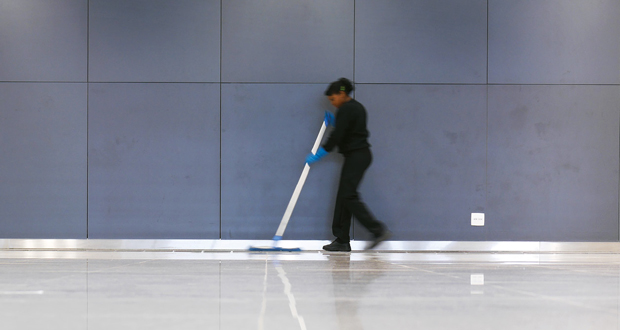A ground-breaking international survey of cleaners, commissioned by UNI Global Union, indicate that cleaners who work shifts other than the day shift experience a range of adverse effects on their lives. These effects include isolation, difficulties in maintaining relationships, strained social lives, poor sleep schedules, exhaustion, and adverse impacts on physical and mental health.
The survey, Working Against the Clock received responses from over 2,500 cleaners in 32 countries across 6 continents, highlights the detrimental effects of night-time on the health, well-being, and social inclusion of workers.
Key Findings:
Shift Disadvantage: Approximately half of the cleaners surveyed work shifts outside of the regular day shift. Statistical analysis indicates that these cleaners face significant disadvantages compared to day-shift cleaners.
Sleep Deprivation: Nearly 70 per cent of night-shift cleaners and over half of early morning and evening shift cleaners report not getting enough sleep. This highlights the detrimental impact of non-day shifts on cleaners’ sleep patterns.
Safety Concerns: Around 45 per cent of female cleaners working the night shift express feeling unsafe at work. A significant number of them have experienced harassment at work and during their commute, with over a third reporting incidents of harassment.
Social and Family Life Conflict: Evening and night-shift workers face higher rates of conflict between their work schedules and their social and family lives compared to their counterparts on the day shift. Testimonies from cleaners emphasise the negative impact on their relationships with their children and partners.
Lack of Choice: Seven in ten cleaners working shifts other than the day shift do so because they have no alternative. This suggests that many cleaners are forced to accept non-day shifts due to limited options or circumstances.
“We have long advocated for a transition to daytime work in the cleaning sector, recognising the negative consequences of irregular and unsocial shifts on workers,” said Eddy Stam, UNI Global Union’s Head of Property Services. “This survey reinforces the urgent need for the industry to address scheduling issues and prioritise the physical and mental health of cleaners.”
The survey reveals that the majority of cleaners surveyed work non-day shifts due to limited options or economic pressures. Many employers and clients do not offer daytime shifts, leaving cleaners with little agency in their work schedules. Moreover, non-daytime shifts often come with higher wages, making them a necessity for workers struggling to make ends meet in an increasingly expensive world.
Notably, the survey captures the voices of cleaners themselves, providing a comprehensive look at the experiences and perspectives of these essential workers. Testimonies from respondents highlight the impact of shift work on various aspects of their lives, including personal relationships, physical health, safety, and social lives.
The findings of this global survey present a call to action for the cleaning industry, urging stakeholders to prioritise the well-being and rights of cleaners.





